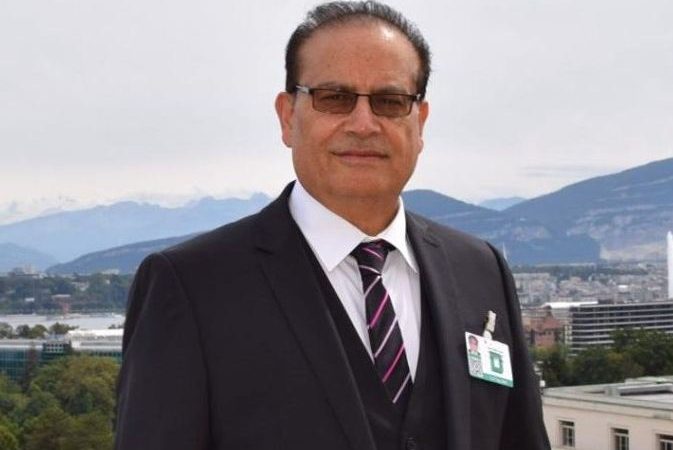“Ramadan was Forgiving, but Eid May Not?”

By: Qamar Bashir
Typically, Eid is anticipated to lower the political temperature, fostering exchanges of gifts, pleasantries, and visits among family, friends, and acquaintances. These interactions provide a valuable opportunity for frank discussions, idea exchanges, and strategic planning, often bringing even sworn enemies closer together. Within close family circles, Eid serves to bridge differences, reconcile belligerent parties, and resolve disputes.
For the country, the entire month of Ramadan presented a mix of positive developments and challenges. On the economic front, the IMF approved the final tranche of the Stand-By Agreement valued at $3.1 billion and has agreed in principle to release the remaining tranche of $1.1 billion. However, a significant challenge arose with the maturity of a $1 billion Eurobond, which coincides with the receipt of the IMF tranche. This will result in the Eurobond payment being offset against the IMF funds, leaving the country with a net balance of zero.
Despite this financial balancing act, there was positive news for the economy. The IMF’s approval of the Stand by Agreement (SBA) and its relatively favorable review of the economic outlook provided a much-needed boost to our stock exchange. This led to an unprecedented upward trend in Pakistan’s stock market history. However, this surge was not accompanied by substantial investment pledges, increased exports, or rising tax collections. Consequently, investors may anticipate significant market volatility and potential capital losses after Eid, as the market corrects itself.
The country remained without the Prime Minister and the largest and most important province of the country without its chief minister who spent the last days of Ramdan on the holy land enjoying the hospitality of the generous host and with VVIP protocol visiting the holy places, offering Umrah and special prayers for the prosperity, growth and safety and security of the monthland.
The Foreign Office ensured the issuance of a joint statement by Pakistan and Saudi Arabia to give this private visit an official outlook and justified the million of dollars spent on it. The highly anticipated meeting between the Prime Minister and Saudi Crown Prince Mohammad Bin Salman, predominantly a male gathering, was marked with the presence of Maryam Nawaz, the only lady in the meeting, who stood out—well-dressed, manicured, and elegant. Interestingly, the Prime Minister, typically expected to exude sobriety and seriousness, was seen cracking jokes and lightening the mood, rather than reflecting the gravity of the ongoing and unabated horrors and miseries inflicted upon Palestinians by Israeli horror throughout Ramadan.
Despite this, the joint statement brought a glimmer of hope, as discussions were held to materialize the initial wave of Saudi investment amounting to $5 billion, part of the larger commitment of $100 billion pledged by Saudi Arabia. This development provided a much-needed fodder for prime-time talk shows and instilled hope among the populace for better days ahead.
During the month of Ramadan, Israel intensified hostilities by relentlessly bombarding Gaza, resulting in a staggering death toll reported by Gaza’s Ministry of Health, with 34,000 casualties, predominantly children and women. Israel’s merciless actions included destroying three World Kitchen vehicles and killing seven volunteers, mostly foreigners, sparking global outrage that even prompted the United States to heed public opinion and urge Israel to halt its aggression, abandon plans for a ground attack on Rafah, and refrain from further violence.
Amidst this grim situation, there was a glimmer of hope on the Palestinian front as the USA, pressured by public opinion, refrained from vetoing a Security Council resolution passed on March 25, 2024. The resolution demanded an immediate ceasefire for Ramadan, the unconditional release of hostages, and urgent expansion of aid into Gaza by opening land, air, and sea routes to allow international aid agencies to deliver essential supplies like food, blankets, water, and medicines to save lives.
During Ramadan, Israel launched a belligerent attack on the Iranian Embassy in Syria, resulting in the deaths of seven high-ranking Iranian leaders and the complete destruction of the building. Iran responded with outrage, vowing to avenge the martyred leaders not only from Israel but also from the USA, which supports Israel. This prompted the US to elevate its alert status for assets in Asia and the Asia-Pacific region, issuing statements to clarify its non-involvement in the Israeli attack on the Iranian Embassy.
As Eid approaches or shortly thereafter, the world may witness proportional and lethal retaliatory strikes by Iran targeting Israeli interests, either directly within Israel or elsewhere, depending on Iran’s strategic objectives and willingness to escalate tensions in the volatile Middle East region. The situation remains highly charged and unpredictable, with potential ramifications that could escalate the conflict further.
During Ramadan, there was a significant development involving Donald Lu, who appeared before a subcommittee of the US Congress amid allegations that he had threatened Pakistan with dire consequences if Prime Minister Imran Khan was not removed from power through an upcoming vote of no confidence. Although Lu denied making such threats, his testimony indirectly acknowledged Pakistan’s controversial election history, where purportedly, PTI candidates who had initially won by outright majority based on Form 45 were later declared losers based on Form 47. Furthermore, Lu expressed full support from the US government toward the newly elected government of Shahbaz Sharif, implying that the government’s survival hinges on maintaining favorable relations with the establishment.
“PTI, seemingly hijacked by inexperienced but ambitious lawyers lacking political acumen, has torn the party apart. Their inept handling led to the loss of the party’s symbol, followed by its name and political capital and deprived the party from reserve seats for women and minorities. The infighting provided ample fodder for media throughout Ramadan, allowing other political parties to raise doubts about PTI’s future. The inexperienced leadership sent conflicting messages, with some aligning with the establishment while others adopted a belligerent posture. This division prompted Chairman Imran Khan to issue anti-establishment rhetoric late in Ramadan, setting the tone for the political climate post-Eid.”
The people of Pakistan, exhausted by relentless political slogans and grappling with hyperinflation, soaring utility and commodity prices, and exorbitant petroleum costs, are bracing for heightened agitational politics. With the exception of PPP and PML(N), all other parties are in aggressive mode. PTI has announced a series of public meetings and rallies, while Maulana Fazal Rehman, having lost much of his political capital post-election, did not find establishment support akin to that received by PPP and PML(N). Founder Chairman Imran Khan has sounded the war drums loudly and clearly.
As the country faces another round of electricity, gas, and petroleum price hikes amidst escalating political confrontation, the burden falls once again on the people, while the elites remain shielded from any repercussions. This situation threatens to deepen Pakistan’s economic and financial crisis, further harming its citizens.
By: Qamar Bashir
Press Secretary to the President (Rtd)
Former Press Minister at Embassy of Pakistan to France
Former MD, SRBC
Related News

Paris Olympics-2024: Games Wide Open
By Qamar Bashir I was posted in France as Press Minister in September 2016, andRead More

Reluctance to digital transformation and the role of positive change management
By Iqbal Hassan, Deputy Executive Director (OGRA) In the age of globalization and technology, manyRead More


Comments are Closed